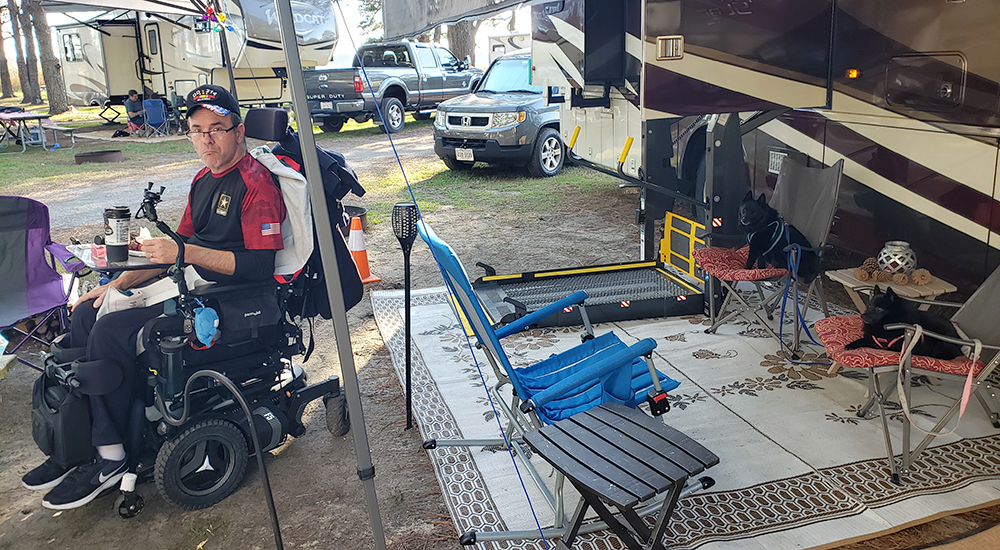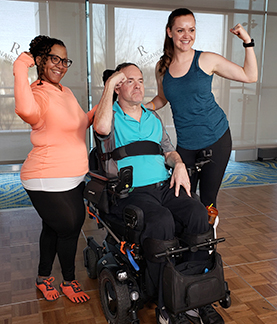Multiple Sclerosis is an unpredictable, often disabling disease. It affects the central nervous system, disrupting the flow of information within the brain and between the brain and body. Nick Mangus, an Army Veteran living with MS, was diagnosed in 1998. Here is his story.
I fell in love with and chose an Army career after attending an ROTC summer camp in college. I was fortunate to receive a full scholarship through ROTC, and after graduating I joined a field artillery unit in 1983. Although I had visual issues and subsequent eye surgeries from my Gulf War deployment throughout the 1990s, I was not diagnosed with MS until 1998.
One morning I woke up and could not feel the left side of my face. I went to the emergency room that morning, and following a series of tests, I was told that I had multiple sclerosis.
After undergoing a medical Military Review Board, I was offered the choice to stay in or leave the Army.
I didn’t feel that my MS symptoms would prevent me from completing my duties so I chose to stay until 2005. At the time, I could have passed any physical fitness test but I was going to be deployed to Afghanistan. I worried that my MS symptoms would be exacerbated by the intense heat, limiting my ability to perform my job and support my team.
I am very grateful and proud of the 23 years I served.
Liaison for Army and Air Force missions in Iraq and Afghanistan
Following my retirement from active duty, I began working with the military as a civilian contractor, coordinating best practices established in the Army with the Air Force for missions in Iraq and Afghanistan. I was a liaison between the two branches for five years and loved what I did, but my MS soon progressed to the point where I felt I could no longer reliably do my job.
One of my fondest post-career activities was attending Penn State home football games with my wife to watch our youngest son perform in the marching band. We never missed a home football game even if there was a foot of snow on the ground.
Lots of parents were tailgating from their RVs and we soon realized that we had to get our own. Our RV not only opened our lives to more comfortable tailgating, it took us to unforgettable destinations around the U.S. Even though I’m less mobile now, I have a new and improved wheelchair accessible RV (pictured above) to keep up our favorite travel hobby.
I’ve had MS for over 20 years and when I look back at some of my choices connected to my MS, there are a few that were game changers for me. I am 100% service-connected for my MS and I have received benefits from VA that have improved my daily living.
Great MS team at Washington, D.C. VA
I receive my MS care at VA in Washington, D.C. It has a great MS team that is always available to me. I also get care at the Richmond VA Spinal Cord Injury program. It has the best rehabilitation services and equipment to help my mobility.
I connected with the National MS Society early on. I stayed physically active in an MS Society swim program for many years. Even volunteered at several MS walks and other events. I also discovered neuro-physical therapy at one of their retreats. This therapy has made a tremendous improvement in my mobility and I strongly recommend it to anyone with early MS.
If I had known about it earlier, I feel I might have greater mobility now. My MS journey might have been much more difficult without seeking resources provided by the National MS Society.
Having a strong support team makes the hurdles much easier to jump through. My support includes family, friends, and people I’ve met at MS events and support programs.
I found a wealth of information and advice from people through meeting others affected by MS who have similar experiences and issues to mine. I found I could tackle anything that came my way with a strong support system.
Surrounded by laughter, love and support
I also found that it’s important to accept help when offered and realize what you can and cannot do for yourself. You may still be able to cook dinner every night but going to the grocery store might be difficult to navigate or take up too much energy.
My health journey has been a complicated and unprecedented road. Not only do I live with MS, but I also have Huntington’s Disease and I survived melanoma. But whatever life throws at me, I won’t let it stop me from enjoying life.
The military taught me teamwork, adaptability and perseverance, and this mindset has stuck with me, especially as I’ve battled my MS. No obstacles put in front of me cannot be overcome. I have a beautiful wife who has loved and supported me through it all. Two sons who have made me so proud and are a constant source of joy.
I have friends and family to talk to and support me. I’m surrounded by laughter, love and support, and I feel blessed by it all.
March is Multiple Sclerosis Awareness Month.
Nick Mangus is a Veteran from Sterling, VA.
Topics in this story
More Stories
Watch the Under Secretary for Health and a panel of experts discuss VA Health Connect tele-emergency care.
The 2024 National Veteran Suicide Prevention Annual Report provides the foundation for VA’s suicide prevention programs and initiatives.
Theranostics is a specialized field of nuclear medicine that uses a two-pronged approach to diagnose and treat cancer.








